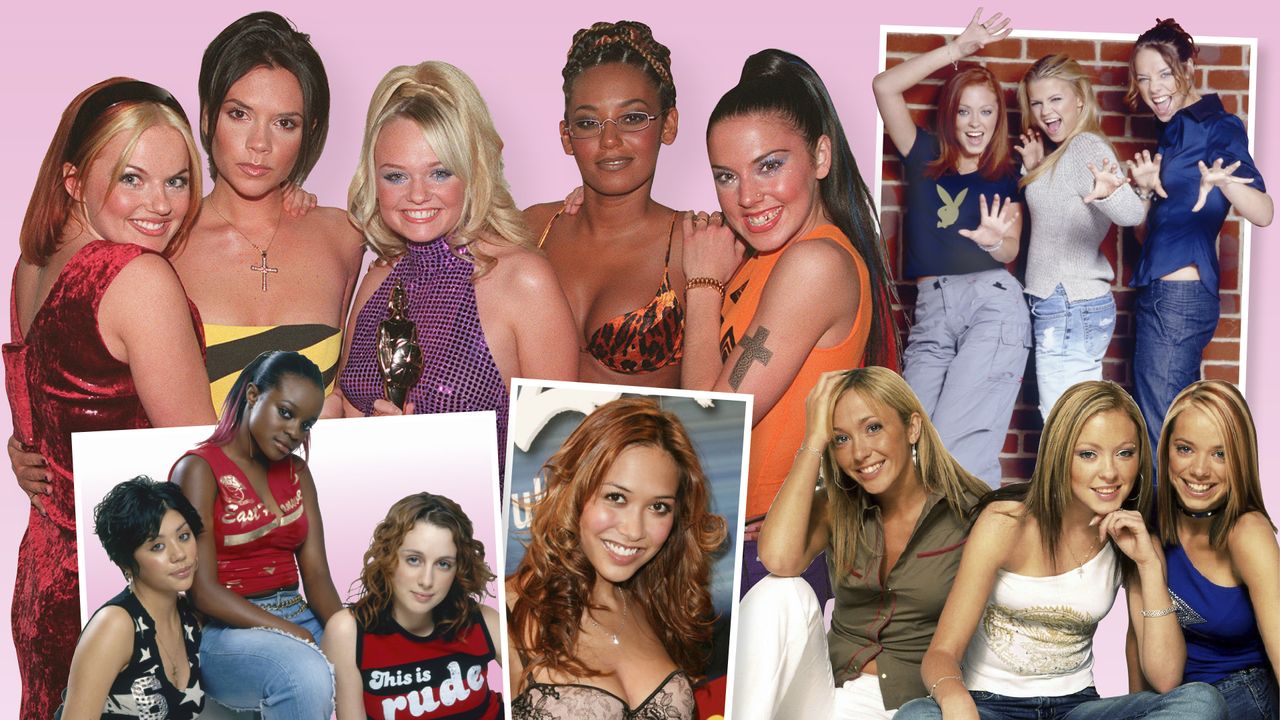
The following content contains references to eating disorders and issues with body image that some readers might find sensitive.
Whether you were dancing around your living room or watching your children do it, Girlbands Forever takes you straight back to the early 2000s - an era of crop tops with combat trousers, hair adorned with butterfly clips, and listening to Wannabe by the Spice Girls on repeat.
The three-part BBC Two documentary is a nostalgic trip down memory lane, for anyone who ever filled out a magazine personality quiz or argued over whether they were Posh, Sporty, Scary, Baby, or Ginger Spice.
Airing from November 1st, the series is also a tell-all deep dive into the pressure the girl bands of the era were under to produce hits and get to the top - and an unflinching look at the misogyny they faced when they got there.
And while it's fun to look back on a time that in your mind's eye seemed simple and carefree, the poor treatment of women wasn't just reserved for the popstars - it was something a lot of women growing up in that era will recall, even if the rose-tinted glasses are firmly on.

Fat shaming was rife in the noughties, both in the music industry and around every corner young girls turned. The same magazines offering quizzes to tell you which girl band member your personality matched, also had entire spreads dedicated to getting a perfectly toned stomach.
"People were always voicing concerns about my weight," Eternal's Kelle Bryan says in the documentary, recalling stylists often telling her, "This doesn’t fit you."
"Being a size zero was popular, looking like a supermodel was important," she says of an era defined by Kate Moss’s now infamous phrase, "Nothing tastes as good as skinny feels."
The members of the group were all "sent away" in a bid to get their bodies to conform to the beauty standards of the time. "We were sent somewhere in the middle of the countryside where they were controlling what we ate," Kelle says, adding, "When I look back on it, I think, 'that was crazy.’"
After this incident, the band's Power of a Woman album aimed to "empower women despite race or size," as Kelle reveals.
The problem is, while viewing the issues raised in the documentary through a nostalgic lens, it's easy to think they've gone away. Except, fat shaming is back, rising, and women are still held to unrealistic beauty standards - we're just no longer wearing hipster jeans and crop tops while coping with it.
In recent years, Derry Girls star Nicola Coughlan and Yellowjackets' Melanie Lynskey are just a couple of examples of women who have been openly called out for their size, and not allowed to exist peacefully in their own bodies.
TikTok came under fire earlier in the year for rolling out an AI "chubby filter" that added weight to users' pictures. The use of the filter was thought to normalise negativity towards larger bodies.
Elsewhere on the platform, it's not uncommon to find fatphobic comments under posts from women not deemed to be the "correct" weight for whoever is viewing their content, and it's constantly trying to keep a lid on frightening pro-eating disorder accounts. An obsession with thinness hasn't gone anywhere.

Another issue laid bare by Girlbands Forever is the misogyny surrounding women enjoying sex, and being forced out of their careers if that sex leads to babies.
Former All Saints band member, Melanie Blatt, recalls the group being vilified by the press for drinking and partying, while the tabloids had a field day shaming them for the number of high-profile boyfriends they had.
"Jack Nicholson’s made a whole career out of it and nobody berates him," Mel says of the actor behaving in the same way but getting away with it because he's a man.
Mel became pregnant at the age of 23, and fellow bandmate Nicole Appleton also fell pregnant at the same time. Disturbingly, Mel claims they were encouraged to end their pregnancies.
"Our manager was behind us telling us to abort our babies," she says, being told they'd "ruin" everything for the band. Mel went on to have a daughter, Lilyella, while Nicole did go on to have an abortion.
Fast forward to 2025, and it's still quite difficult for women not to be frowned upon for wanting to have a baby and a career - organisations such as Pregnant Then Screwed exist for a reason.
According to their website, every year, 54,000 women lose their job just for becoming pregnant, while 390,000 working mums face negative or discriminatory treatment at work - these figures have almost doubled in a decade - what were we saying about lack of progression when it comes to the treatment of women?
While you tune in to Girlbands Forever, you might want to prepare yourselves to rally and become angry for your fellow women who, while undoubtedly having some of the best times of their lives, were also taken advantage of and mistreated by an industry they'd invested years in to become a part of.
On the other hand, you'll be delightfully reminded what an absolute tune Never Ever was - and still is. Nothing wrong with having that banger of an earworm living in your head for some time afterwards.
If you're concerned about an eating disorder, information is available on the BEAT website. BEAT are the UK’s eating disorder charity, and their mission is to end the pain and suffering caused by eating disorders.
Girlbands Forever airs on November 1st at 9:20pm on BBC Two and will be available on BBC iPlayer.







